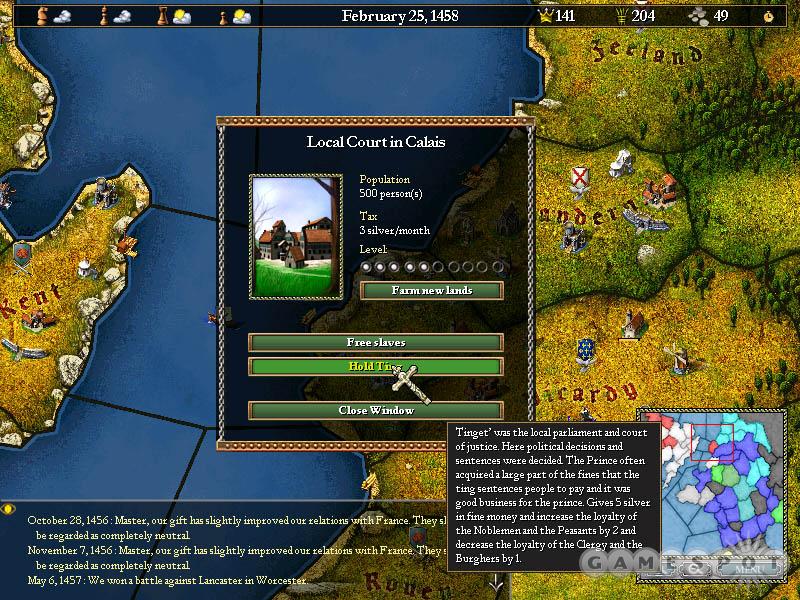Some parts of history naturally have more widespread appeal than others, if only because the stories have been retold many times, in many ways. So it's not surprising that Paradox's latest spin-off from Europa Universalis has moved to more recognizable territory. From the early medieval Scandinavia in Crown of the North, Two Thrones takes us to the most famous Western European conflicts of the 14th and 15th centuries: the Hundred Years' War and the War of the Roses. With France and England locked in fierce wars of succession for more than a century and a half, there's plenty of opportunity to reshape the map. But while this is certainly fertile ground for a game of conquest, Europa Universalis II's mechanics for combat and nation building have been simplified to the point of removing much of the challenge.

Two Thrones is designed to be accessible for new players, and compared to Paradox's other famously detailed, notoriously complex strategy games, it's amazingly easy to pick up. Two Thrones adopts a simple board game approach, centering nearly all actions on the main map screen. The attractively rendered map breaks England, France, and surrounding territories into a manageable number of provinces, so it's not hard to keep track of what's going on. The game's five scenarios all use the same map, with the ownership of various territories reshuffled to match a few paragraphs of historical introduction you can read at the main menu. No matter which of the three starting points (the first in 1337) you choose for the Hundred Years' War, the goal is to earn the most victory points by 1453, so the other victory goal of conquering the entire map actually is a feasible option. The two War of the Roses scenarios (1453 and 1470) are really quite similar to the others, except that only the houses of York and Lancaster are playable, and English holdings on the continent are extremely limited, so total conquest will involve ferrying troops across the channel.
What reminds you that this isn't a straight conquer-the-world game like Risk is that story boxes pop up with random or scripted events. Choosing to support a pretender to a foreign throne won't just affect your relations with a neighbor, but might also start your own nobility grumbling. The effect of these events is to remind you of internal affairs and the need to balance the interests of the nobility, clergy, townspeople, and peasants, and the relative contentment of each has a global effect on your economy and building speeds--for instance, keeping the townspeople happy grants a boost to trade income. But while they provide some historical flavor, the events don't add to the game's challenge, since a pop-up reveals the exact numerical consequences of each choice, and the standard game is balanced such that all social groups will come to love you if you have some extra money to throw around.
Two Thrones' building and economic model couldn't be much simpler. A half-dozen types of infrastructure--farms, markets, town size, defenses, and military muster points--are graphically represented for each province. Click on one of the buildings and you can upgrade it, build military units, or tweak some social settings that the event system mostly makes extraneous. Each province can execute only two actions at once--upgrading one structure and building one unit--so unless you have many territories, the game's progress can seem very slow. But fortunately the scenarios are focused around France and England, which both control plenty of land. There's no build queue or overview screen to see what's being built where, so it's up to you to keep things going.
As a result, the major gameplay focus becomes clicking through all the various territories to keep provinces building away. And while grain (mostly used for training cheap militia) and silver are scarce at first, concentrating early upgrades in expanding your tax base gets the money pouring in. Higher upgrade levels are almost exponentially more effective but cost no more to research than lower-level upgrades, thus some strategies seem overwhelmingly effective. At the default settings, the AI opponents are quite content to sit back and wait for you to attack. While scripted event choices can instantly trigger war or peace, getting into the good graces of historical enemies is simply a matter of sending numerous gifts.

Two Thrones is as visually attractive as you could want a simple 2D strategy game to be, but the game lacks polish in specific areas. The map graphics are quite sharp and evoke the local terrain, but the overall presentation could have used an interface to streamline the building process and the management of far-flung territories. What might really throw those who've appreciated Paradox's track record for historical authenticity are a few elements from Crown of the North that become blatant anachronisms in the new setting. The most obvious are the "hold ting" and "free slaves" options in the town screen, which only made sense for a game with nations of Viking descendants.
As a straightforward, value-priced grand strategy game, Two Thrones succeeds at providing a leisurely paced way of walking through a critical period that did much to decide the paths of England and France. However, the scope is certainly limited compared to other Paradox games, and Europa Universalis II isn't included in the package, as it was in Crown of the North. The relatively limited scope, clunky build interface, and lackluster AI mean this isn't a game for veteran strategy gamers looking for a challenge.